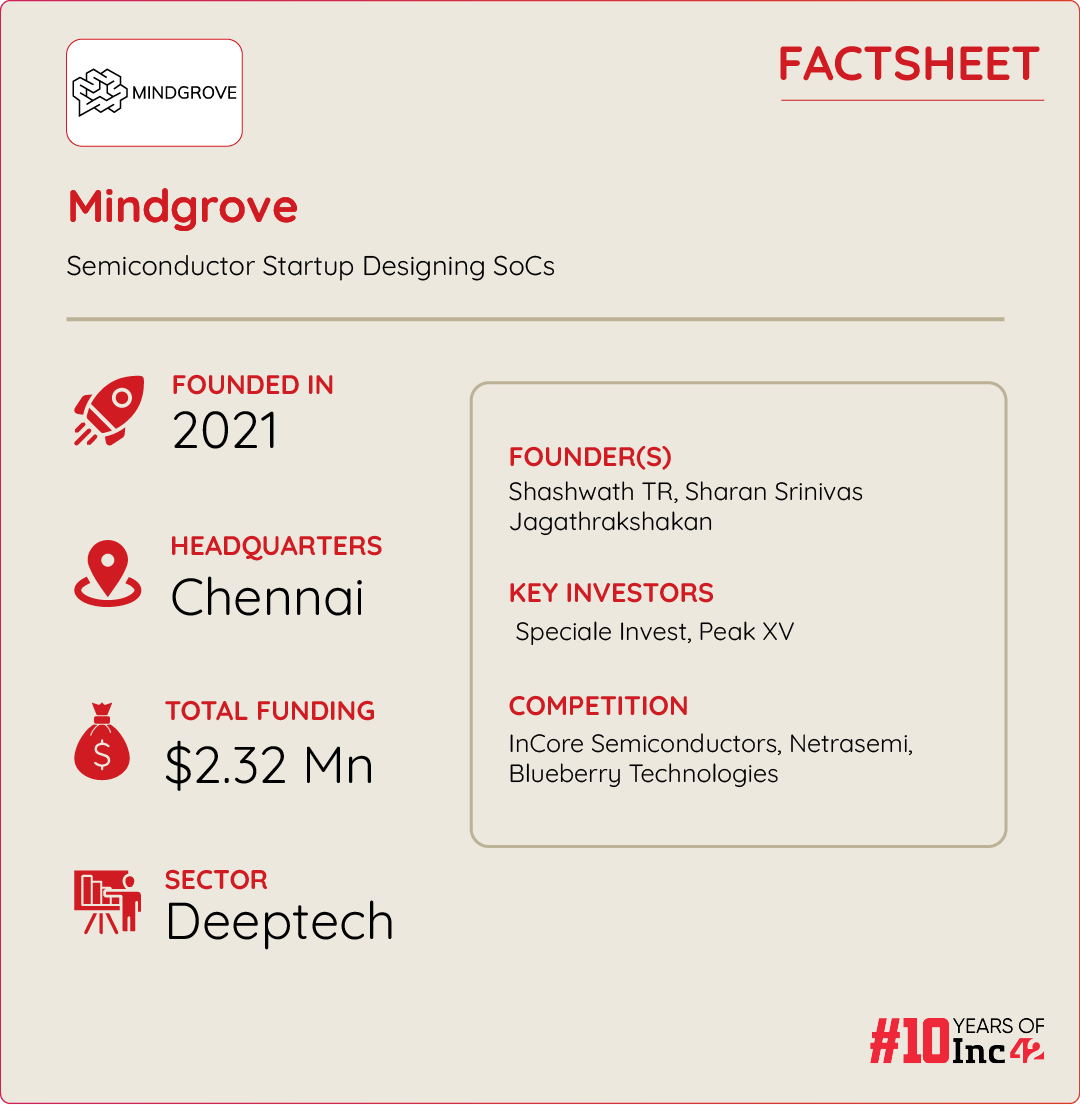How Semiconductor Startup Mindgrove Is Powering Smart Devices With Low Cost, High-Performance Chips

With the country’s semiconductor industry projected to breach the $150 Bn mark by 2030, helped by rising government support, financial help from the VC ecosystem, and more entrepreneurs entering the fray, it is now important to understand why this space is of essence for the country that fosters the world’s third-largest startup ecosystem.
Well, while the country has long been home to innovative semiconductor companies, particularly those excelling in design and engineering, we have been miles away from becoming a leader in semiconductor manufacturing. This has been largely due to China’s dominance of the semiconductor space, which it enjoys on the back of the abundance of rare earth elements in the region.
Today, with external funding on the rise and India’s shifting position in the global tech landscape, many established semiconductor companies and several newly founded startups are experiencing renewed optimism.
One such startup is Chennai-based Mindgrove which has designed and developed System on Chips (SoCs) to cater to the growing demand for semiconductor chips for a diverse range of products, including smart watches, smart locks, CCTVs, power meters, and smart fans, just to name a few.
Founded in 2021 by Shashwath TR and Sharan Srinivas Jagathrakshakan, Mindgrove has built microcontroller chips and is looking to tap into the global smart devices market projected to reach $116.4 Bn within the next five years.
While cofounder Jagathrakshakan is pursuing PhD from IIT Madras and has experience of working as a software engineer, Shashwath, the CEO and cofounder, brings over a decade of industry experience as an engineer.
Having worked in the same company, the duo came together to start Mindgrove to use their years of knowledge and expertise in the fields of science and technology for disruption.
It is one of the few deeptech startups born as a product of collaboration between the government, academia, and the startup ecosystem at IIT Madras.

The Genesis Of Mindgrove
Despite incorporating the startup in 2021, the cofounders spent the next several months conceptualising the core strategy and technology to be built. In the later half of 2022, the founders started planning their execution while also approaching VCs for funding.
By this time, the cofounders zeroed in on their core thesis, which was to build chips that are sophisticated but not too complex, could be built by deploying a small team and can be quickly floated in the market.
By April 2023, the startup had acquired all the tools to make the chip. Just a year ago, in August 2022, its design entered the fabrication stage.
Precisely a year later, first 10 chips reached Mindgrove and since then the prototype chip has been undergoing multiple layers of testing.
In fact, in May this year, the startup made a formal announcement of taping out its chip Secure IoT, which Mindgrove claims to be India’s first commercial high-performance SoC.
“Our initial focus is to cater to the manufacturing of electronic devices like power metres, biometric devices, and other smaller smart gadgets, which require a little bit of processing, a good amount of inputs and outputs, and security,” Shashwath said.
The startup is set to soon wrap up the detailed testing phase of its SoCs and then start piloting them with its potential customers using 70 chips.
The startup aims to start a full-fledged production process of Secure IoT by the end of this year.
Notably, Mindgrove could also make its place in Peak XV’s Surge 09 cohort, which kicked off in October last year. In 2023, the startup raised $2.32 Mn in its seed funding round from Peak XV Partners and Speciale Invest, among others.
What’s In The Mindgrove Tech Stack?
Given that India is home to several semiconductor design companies, various technologies are being built around SoCs to cater to various target groups. While some startups cater to more sophisticated use cases such as telecommunications and aerospace, others work in less complex areas like IoT and automotive.
As a fabless SoC startup, Mindgrove competes with several domestic players, including InCore Semiconductors, Netrasemi, Blueberry Technologies, and Sensesemi.
While theoretically any processor is capable of executing any task that any other processor is capable of doing, the real differences come in terms of speed, efficiency, and cost — areas Mindgrove claims to have tamed.
One of Mindgrove’s key differentiators is its Secure IoT SoC — amicrocontroller. This chip is designed to offer programmability, flexibility, security, and superior computing power for controlling applications on various connected smart devices, all at an estimated 30% lower cost compared to similar chips in the market.
According to Arjun Rao, partner at Speciale Invest, Mindgrove’s technology is an attractive proposition as it is superior to many global players, particularly the Chinese counterparts, in terms of performance, cost and speed.
Noting that semiconductor startups across the globe have a high gestation period, Rao said Mindgrove’s ability to tape out its chips within a reasonable time frame is highly commendable. “It is also among the very first ones in the country to have a chip tapped out, which is also a big win for Mindgrove,” Rao added.
The Way Forward For Mindgrove
While the startup is already in talks with potential customers, it has yet to sign the final agreements. Notably, Mindgrove is primarily targeting the Indian electronics manufacturing market – from international players manufacturing consumer electronics devices in India to domestic OEMs.
It aims to start the deployment of its chips in electronic devices in the next one year. In the meantime, the startup aspires to start working on building its second category of SoC.
Mindgrove’s second range of chips will be more sophisticated than the first one and built for applications that require larger cameras and displays. However, the startup clarifies that it is not targeting the smartphone segment, as it is not yet ready to lock horns with giants like Apple and Qualcomm.
Meanwhile, the startup sees increasing opportunities in the EV segment, which it plans to tap into after a few years with a long-term view.
With India’s semiconductor and electronics manufacturing Industry witnessing burgeoning growth, the future prospects for a startup like Mindgrove are significant as the establishment of manufacturing fabs in India could further lower capex, ultimately adding more edge to its upcoming technologies.
[Edited by Shishir Parasher]
The post How Semiconductor Startup Mindgrove Is Powering Smart Devices With Low Cost, High-Performance Chips appeared first on Inc42 Media.
No comments